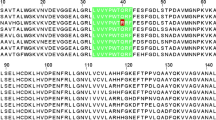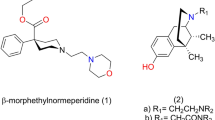Abstract
β-Endorphin (β-LPH61–91) is a well known endogenous opioid ligand. It and related peptides have recently been implicated in the control of adaptive behaviour. Smaller β-endorphin fragments appeared to be more active moieties than the parent molecule in a number of behavioural situations1. Their effects seemed to occur independently of interaction with opiate receptor sites in the brain. Moreover, elimination of the opiate-like properties of γ-endorphin (β-LPH61–77) by removing the N-terminal amino acid yielded des-tyrosine-γ-endorphin (β-LPH62–77, dTγE) which had greater behavioural activity than γ-endorphin2,3. The CNS effects of dTγE resembled those of neuroleptic drugs in several test systems, α-Endorphin (β-LPH61–76) exerted effects opposite to those of dTγE and in some aspects its activity was comparable to that of psychostimulant drugs4. This opposition of effects suggests that a balance between γ- and α-type endorphins is involved in the control of brain function5. We report here that either γ-endorphin and dTγE or α-endorphin and des-tyrosine-α-endorphin (β-LPH62–769 dTαE) can be formed preferentially from β-endorphin by enzymes associated with an enriched synaptosomal plasma membrane fraction from brain. It is suggested that these enzymes have a role in brain homeostatic mechanisms by regulating the generation of these substances.
This is a preview of subscription content, access via your institution
Access options
Subscribe to this journal
Receive 51 print issues and online access
$199.00 per year
only $3.90 per issue
Buy this article
- Purchase on Springer Link
- Instant access to full article PDF
Prices may be subject to local taxes which are calculated during checkout
Similar content being viewed by others
References
De Wied, D., Bohus, B., van Ree, J. M. & Urban, I. J. Pharm. exp. Ther. 204, 570–580 (1978).
De Wied, D., Bohus, B., van Ree, J. M., Kovács, G. L. & Greven, H. M. Lancet i, 1046 (1978).
De Wied, D., Kovács, G. L., Bohus, B., van Ree, J. M. & Greven, H. M. Eur. J. Pharmac. 49, 427–436 (1978).
Van Ree, J. M., Bohus, B. & de Wied, D. in Endogenous and Exogenous Opiate Agonists and Antagonists (Way, E. L., ed.) (Pergamon, New York, in the press).
De Wied, D. in Characteristics and Function of Opioids (eds van Ree, J. M. & Terenius, L.) 113–122 (North-Holland, Amsterdam, 1978).
Loeber, J. G., Verhoef, J., Burbach, J. P. H. & Witter, A. Biochem. biophys. Res. Commun. 86, 1288–1295 (1979).
Terenius, L. Actapharmac. tox. 32, 317–320 (1973).
Austen, B. M. & Smyth, D. G. Biochem. biophys. Res. Commun. 77, 86–94 (1977).
Austen, B. M., Smyth, D. G. & Snell, C. R. Nature 269, 619–621 (1977).
Marks, N., Grynbaum, A. & Neidle, A. Biochem. biophys. Res. Commun. 74, 1552–1559 (1977).
Patthy, A., Gráf, L., Kenessey, A., Székely, J. I. & Bajusz, S. Biochem. biophys. Res. Commun. 79, 254–259 (1978).
Author information
Authors and Affiliations
Rights and permissions
About this article
Cite this article
Burbach, J., Loeber, J., Verhoef, J. et al. Selective conversion of β-endorphin into peptides related to γ- and α-endorphin. Nature 283, 96–97 (1980). https://doi.org/10.1038/283096a0
Received:
Accepted:
Issue Date:
DOI: https://doi.org/10.1038/283096a0
This article is cited by
-
Methionyl aminopeptidase from rat liver: distribution of the membrane-bound subcellular enzyme
Molecular and Cellular Biochemistry (1991)
-
Emitic and antiemetic properties of some regulatory peptides
Bulletin of Experimental Biology and Medicine (1987)
-
Ion-pair high-performance liquid chromatography separation of β-endorphin-(6–17) from fourteen fragments
Chromatographia (1986)
-
Influence of substance P and fragments on passive avoidance behavior
Experientia (1984)
Comments
By submitting a comment you agree to abide by our Terms and Community Guidelines. If you find something abusive or that does not comply with our terms or guidelines please flag it as inappropriate.



